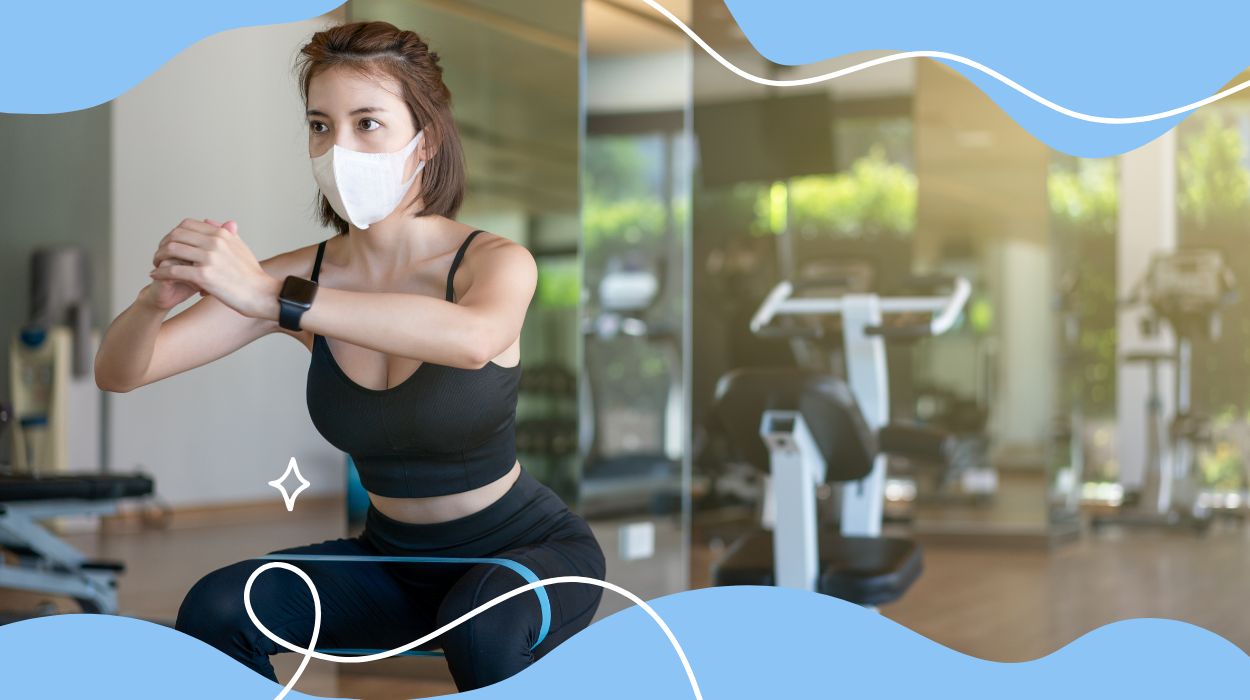 Expert's opinion
Expert's opinion
Expert's opinion
The article is a subjective view on this topic written by writers specializing in medical writing.
It may reflect on a personal journey surrounding struggles with an illness or medical condition, involve product comparisons, diet considerations, or other health-related opinions.
Although the view is entirely that of the writer, it is based on academic experiences and scientific research they have conducted; it is fact-checked by a team of degreed medical experts, and validated by sources attached to the article.
The numbers in parenthesis (1,2,3) will take you to clickable links to related scientific papers.
How To Lose Weight In Quarantine 2024? – 5 Tips For Weight Loss At Home

We all know that a pandemic is upon us, but have you secretly gained weight during the pandemic’s lockdown in the past year? Are you putting aside your fitted work pants and instead settling for those oh-so-comfy tracksuit bottoms?
You might not be alone. We have naturally become less active, particularly for those working from home or self-isolating. Our health may have deteriorated, and we might have developed unhealthy eating habits along the way. If you’ve gained weight and feel stuck in a slump, don’t panic and read on to find out how you can still lose weight while spending time at home while in quarantine. The following information will help your weight loss journey faster and more effectively.
How To How To Lose Weight In Quarantine?
Here are five ways to focus on if you want to shed some pounds and increase physical activity while self-isolating or staying at home due to the COVID-19 pandemic.
5 Tips To Lose Weight During The Pandemic
For the past year, your lifestyle has been forced to change, and if you’re stuck at home all day, you will inevitably feel stressed and bored. What better way to relieve anxiety than by tucking into another bag of chips while binge-watching your favorite television show?
According to a survey on stress-related topics during the COVID-19 pandemic conducted by the American Psychological Association (APA), 42 percent of US adults,[1] suffered from weight gain (affecting more women than men). The median weight gained was 15 pounds, hence the term “Quarantine 15,[2]“, which has taken social media by storm.
If you’re fortunate enough to work from home every day, you might have a bit more flexible free time on your hands. Before the pandemic, perhaps you’ve wanted to eat healthily and exercise, but your excuse was ‘never having the time’ – well, now’s the time!
Some people tackle this weight gain with what they call the “Pandemic Diet,” but it’s essential to realize that the fundamentals of weight loss still apply, and that is to eat a well-balanced diet and exercise regularly.
So whether you stepped onto the scale and realized you’ve gained an extra 5 pounds, 15 pounds, or 50 pounds, here are some ways to shift that excess weight.
Increase Physical Activity
Pandemic or not, one way to help lose weight and maintain good health is to be physically active. While you don’t have to engage in a high-intensity workout or go to the gym, increasing any form of physical movement provides many health benefits.
Maybe you could go for a short walk at least once a day, do some gardening, or give your house another round of vacuuming, making it extra clean and also helping shed more calories.

- Increase daily steps: Studies suggest that adults should take approximately 7,000 to 10,000 steps per day,[3]. You can use an app on your phone or purchase a step-counting device such as a pedometer and increase your daily figure. Perhaps you could support and encourage friends and family to compete together for the most daily steps.
- Try online exercise programs: If you’ve always wanted to try yoga or pilates or another fitness program but were shy of putting yourself out there – now is the perfect time to start. Check for online streaming courses or sessions you can participate in in the comfort of your own home.
So you’ve saved all that extra commute time, don’t waste it by sleeping in an extra half hour. Instead, get up, get dressed and do some exercise. All the additional steps accumulate over the course of a week.
Stay Hydrated
Water is essential for keeping you alive. Keeping yourself hydrated is vital for good health. Most people don’t drink enough water during the day; adults should drink at least 1.5L of water each day,[4], particularly after a workout, to prevent dehydration. In addition, staying away from sugary drinks is also essential for a faster weight loss journey.
Dehydration can affect the ability to concentrate on your work. If you are dehydrated, your body can make you feel hungry when in fact, it’s water that you need. If you prefer, you can mix a little fruit juice to add some taste.
Drinking water helps prevent mindless eating, and you won’t feel ravenous at mealtimes and are therefore less likely to overeat. So place a refillable water bottle on your desk while you work or near your side, sipping it regularly throughout the day to combat headaches and prevent fatigue.
Try to drink caffeinated drinks, such as coffee only in moderate amounts as they can cause you to lose more water. There is some evidence that green tea contains catechins and caffeine, which may increase energy metabolism,[5], which can help you in losing weight.
Drinking more fluids results in more trips to the restroom, which increases daily steps. Make sure you only drink alcohol in moderation as too much can affect appetite control, causing you to overeat.
Eating Healthier With Homemade Meals
With your extra time, you can try to prepare and cook your meals. You might even want to take this opportunity to perfect your culinary skills.
But if you’ve always opted for takeaways or restaurant food, then try cooking a simple, balanced meal to begin with, such as chicken with broccoli and pasta.
You might want to eat foods low in fat but high in fiber, protein, and whole grains that enhance satiety,[6], making you feel full for longer, controlling your appetite making you less likely to overeat.
- High-Protein Food: Protein that you eat helps build and maintain muscle mass, and increased muscle mass means your body burns more calorie intake at rest.
- High-Fiber Food: When you eat high-fiber foods, you can postpone hunger,[7] and reduce sugar and carbohydrate cravings, reducing the need to snack on sweet food.
But don’t worry, plan and prepare each meal every week, search for foods and recipes high in nutrients and eat plenty of fresh fruits and vegetables.
Healthy Eating By Planning Your Snacks
Snacking is all too easy when you are spending most of your days at home. Studies reveal that snacking contributes to one-third of our daily energy intake,[8]; unfortunately, this figure may have risen during recent pandemic times.
Eating healthy snacks is an excellent way to control your appetite. This way, you know what to expect and won’t become ravenous and end up consuming a lot of junk food just before meals.
Many snacks are nutritionally deficient but energy-dense. Try to choose healthy snacks such as fresh fruits and low-fat refrigerated products, such as low-fat yogurt. This will encourage you to walk to the fridge and burn a few extra calories.
Again, try to choose nibbles high in protein and fiber, such as prunes, popcorn, dairy, nuts, yogurt, and soy.

Avoid bringing foods that you can store on your desk, so you don’t have the option to snack on them mindlessly while you work. Try to sort your snacks out into individual portions and only consume one portion at a time.
Stick To A Routine
You might find yourself losing track of time when you’re at home 24/7, and this applies both to your working schedule and your mealtimes. It’s so easy to munch mindlessly while you’re working, particularly if you’re the only one at home.
You can quickly develop a lifestyle with unhealthy eating habits, which inevitably leads to weight gain. Plan your mealtimes and snacks in between and stick to them; it will do you good in the long run.
To improve your health, start each day on a positive note, with a mental high. Do not stay in your pajamas all day; instead, get dressed, make yourself presentable, and take a stroll.
Other Tips Avoid Quarantine Weight Gain
If you have gained weight during quarantine, here are some additional tips if you want to lose weight fast. Here are a few other methods to help you shed some pounds.
- Stand While Working: Working from home might involve you sitting in front of a desk or computer for long hours during the day. Studies show long sitting periods,[9] may increase the risk of diabetes, obesity, high blood pressure, and musculoskeletal disorders. Try to stand around 2 to 4 hours per day,[10].
- Get Enough Sleep: Aim to get at least eight hours of uninterrupted sleep per night. Refrain from using electronic devices shortly before bedtime to avoid difficulties falling and staying asleep.
- Consider Intermittent Fasting: Intermittent fasting might be a good way to diet, particularly if your working hours are more flexible now you are working from home. Intermittent fasting cycles between periods of eating and fasting; choose one with a feeding window that works for you.
You could adapt your own version of intermittent fasting by eating breakfast later in the morning and having dinner at an earlier time. This way, you have an extended period of fasting before your next meal.
You should still consume healthy meals while intermittent fasting, but you need to eat fewer calories per day when your feeding window is restricted.
Causes of Weight Gain
The pandemic inevitably changed our lifestyle; the APA revealed that weight changes,[1], particularly gaining weight, were seen in many US adults during the pandemic. Studies,[11] show that the most common risk factors that probably made you gain weight were:
- Stress-related eating
- Reduced physical movement
- Altered and inappropriate eating patterns
- Inadequate sleep
Conclusion
- Don’t stop moving: Increasing any form of physical activity helps to burn extra calories, helping the healthy weight loss journey. As well as keeping your body healthy, exercise boosts your metabolism and mental health.
- Keep drinking water: Staying hydrated helps to curb hunger, prevent headaches, and help you perform better at work.
- Make your own food: Choose simple recipes with foods high in protein and fiber. Try to avoid processed foods and those high in sugar and fat.
- Plan healthy snacks: Control your snack portions sensibly throughout the day and keep them out of easy reach to prevent mindless snacking.
- Keep to a schedule: Try to have some consistency in your daily routine, and that includes your snack and mealtimes.
The main reasons for weight gain during the pandemic were stress-related, reduced exercise, drastic eating habits, and insufficient sleep. If COVID-19 has impacted your life severely, know that you are not alone and don’t be too hard on yourself! Whatever you eat, make sure you stay positive and focus on one day at a time.
+ 11 sources
Health Canal avoids using tertiary references. We have strict sourcing guidelines and rely on peer-reviewed studies, academic researches from medical associations and institutions. To ensure the accuracy of articles in Health Canal, you can read more about the editorial process here
- Weir, K. (2021). The extra weight of COVID-19. [online] https://www.apa.org. Available at: https://www.apa.org/monitor/2021/07/extra-weight-covid.
- Pearl, R.L. (2020). Weight Stigma and the ‘Quarantine‐15’. [online] 28(7), pp.1180–1181. doi:https://doi.org/10.1002/oby.22850.
- Catrine Tudor-Locke, Craig, C.L., Aoyagi, Y., Bell, R.C., Croteau, K.A., Ilse De Bourdeaudhuij, Ewald, B., Gardner, A.W., Hatano, Y., Lutes, L.D., Matsudo, S., Ramirez-Marrero, F.A., Rogers, L.Q., Rowe, D., Schmidt, M., Tully, M.A. and Blair, S.N. (2011). How many steps/day are enough? For older adults and special populations. [online] 8(1), pp.80–80. doi:https://doi.org/10.1186/1479-5868-8-80.
- Jéquier, E. and Constant, F. (2009). Water as an essential nutrient: the physiological basis of hydration. [online] 64(2), pp.115–123. doi:https://doi.org/10.1038/ejcn.2009.111.
- Jurgens, T.M., Anne Marie Whelan, Killian, L., Doucette, S., Sara and Foy, E. (2012). Green tea for weight loss and weight maintenance in overweight or obese adults. [online] 2012(12). doi:https://doi.org/10.1002/14651858.cd008650.pub2.
- Valentine Yanchou Njike, Smith, T.M., Omree Shuval, Kerem Shuval, Edshteyn, I., Kalantari, V. and Yaroch, A.L. (2016). Snack Food, Satiety, and Weight. [online] 7(5), pp.866–878. doi:https://doi.org/10.3945/an.115.009340.
- Brennan, M.A., Derbyshire, E., Brennan, C.S. and Tiwari, B.K. (2012). Impact of dietary fibre-enriched ready-to-eat extruded snacks on the postprandial glycaemic response of non-diabetic patients. [online] 56(5), pp.834–837. doi:https://doi.org/10.1002/mnfr.201100760.
- Valentine Yanchou Njike, Smith, T.M., Omree Shuval, Kerem Shuval, Edshteyn, I., Kalantari, V. and Yaroch, A.L. (2016). Snack Food, Satiety, and Weight. [online] 7(5), pp.866–878. doi:https://doi.org/10.3945/an.115.009340.
- Hadi Daneshmandi, Alireza Choobineh, Haleh Ghaem and Karimi, M. (2017). Adverse Effects of Prolonged Sitting Behavior on the General Health of Office Workers. [online] 7(2), pp.69–75. doi:https://doi.org/10.15280/jlm.2017.7.2.69.
- Gibbs, B.B., Kowalsky, R.J., Perdomo, S.J., Grier, M. and Jakicic, J.M. (2016). Energy expenditure of deskwork when sitting, standing or alternating positions. Occupational Medicine, [online] 67(2), pp.121–127. Available at: https://pubmed.ncbi.nlm.nih.gov/27515973/.
- Zachary, Z., Forbes Brianna, Lopez Brianna, Garrett, P., Jade, W., Deyo Alyssa and Kerekes Mikayla (2020). Self-quarantine and weight gain-related risk factors during the COVID-19 pandemic. [online] 14(3), pp.210–216. doi:https://doi.org/10.1016/j.orcp.2020.05.004.



